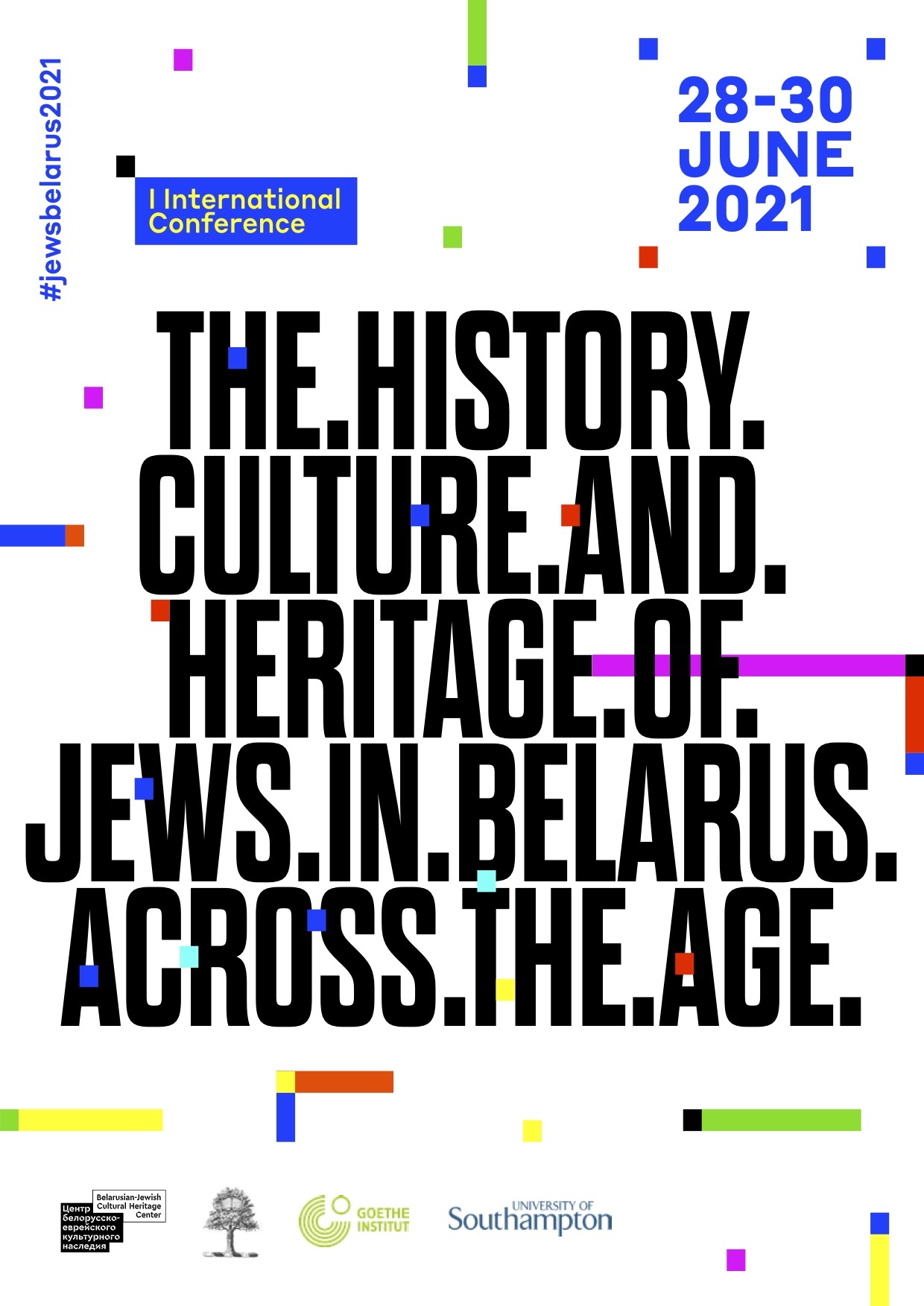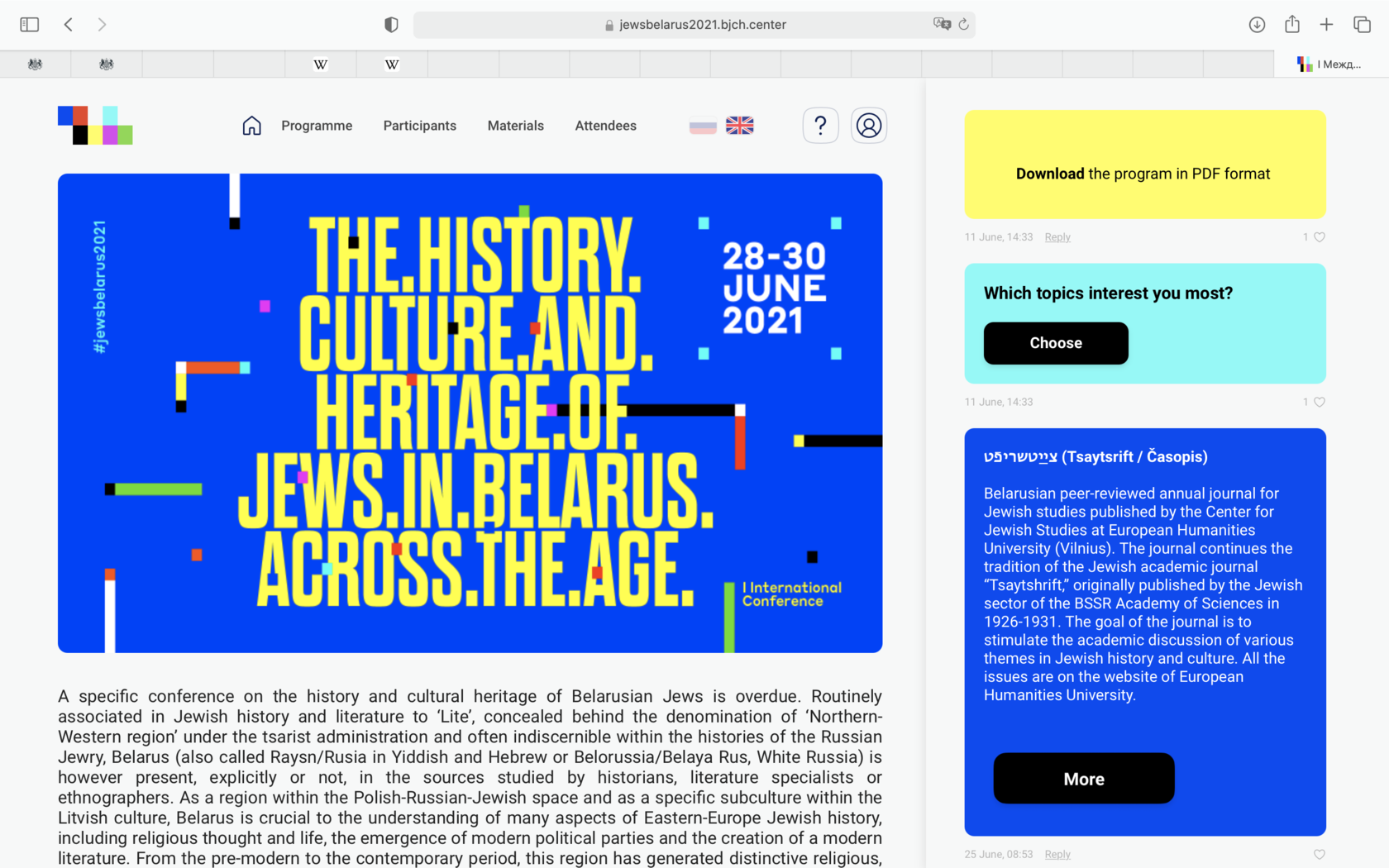I INTERNATIONAL CONFERENCE
Where: online
When: 28/06/2021 - 30/06/2021
When: 28/06/2021 - 30/06/2021

[ about the project ]
The conference has become a unique platform for discussing what is special about the history of Jews in Belarus. It brought together senior specialists and young researchers from Eastern Europe and other parts of the world to evaluate the latest findings on all aspects of the history, culture and heritage of Jews in Belarus, including the emergence of a distinctive Belarusian-Jewish identity.
The programme included panels on art, pre-revolutionary history, ethnography, heritage, Holocaust, interwar period, language and literature. Two roundtables on heritage challenges and priorities and the identity of Jews in and from Belarus have taken place. The scientific committee was composed of the world-renowned specialists Elissa Bemporad, Arakdii Zeltser, Mikhail Krutikov, Magdalena Waligorska, Alexander Ivanov, Shaul Stampfer, Maria Kaspina and Claire Le Foll.
CONFERENCE
"One of the key objectives of the Center is to create the Jewish Museum in Belarus as a modern and full-fledged platform, including research and educational centers. A place for dialogue, for rethinking heritage, where new forms of its presentation are developed and new impulses emerge. But in order to create such a museum, it is not enough to find premise and exhibits. It is important to understand what it's concept should be, what is special in the history of Belarusian Jews and how Belarus and our heritage should sound in the world; to define what is the Jewish heritage for us now, how to speak correctly about it and in what direction to move further. And this Conference is the most important step towards this goal."
Maya Katznelson, founder of the Belarusian-Jewish Cultural Heritage Center
Maya Katznelson, founder of the Belarusian-Jewish Cultural Heritage Center


Routinely associated in Jewish history and literature to 'Lite', concealed behind the denomination of 'Northern-Western region' under the tsarist administration and often indiscernible within the histories of the Russian Jewry, Belarus (also called Raysn/Rusia in Yiddish and Hebrew or Belorussia/Belaya Rus, White Russia) is however present, explicitly or not, in the sources studied by historians, literature specialists or ethnographers.
As a region within the Polish-Russian-Jewish space and as a specific subculture within the Litvish culture, Belarus is crucial to the understanding of many aspects of Eastern-Europe Jewish history.
The conference was held online on a specially designed platform and has generated high interest and engagement from the public. There were about 700 registrations during the conference. Based on the results of the work, it is planned to develop a research network, a working expert group to create a concept for a museum and educational programs.
[ to watch ]
VIDEO
Curated by:
Claire Le Foll, University of Southampton
Maya Katznelson, Belarusian-Jewish Cultural Heritage Center
Claire Le Foll, University of Southampton
Maya Katznelson, Belarusian-Jewish Cultural Heritage Center
German Minister of Foreign Affairs (Eastern partnership program)
Parkes Institute (University of Southampton)
British Embassy in Belarus
Israel Embassy in Belarus
Polish Institute in Belarus
European Humanities University
Technical support: Unicornservice.by
Design: Vladimir Gorz
Parkes Institute (University of Southampton)
British Embassy in Belarus
Israel Embassy in Belarus
Polish Institute in Belarus
European Humanities University
Technical support: Unicornservice.by
Design: Vladimir Gorz
Belarusian-Jewish Cultural Heritage Center
in collaboration with
University of Southampton
Goethe Institute in Belarus
in collaboration with
University of Southampton
Goethe Institute in Belarus
SUPPORTED BY
ORGANIZED BY
